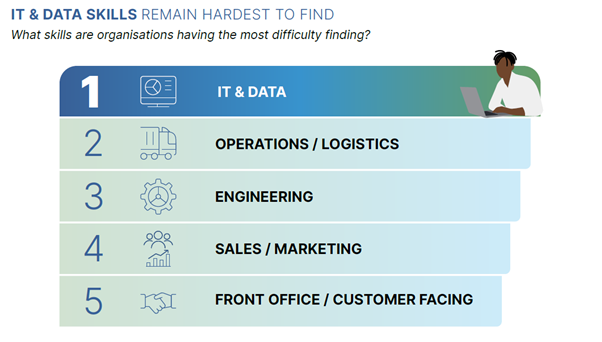New year, same problems. Despite a softening in the general labour market, IT and tech organisations are still struggling to hire the talent they need
While the nation’s long-running talent shortage has probably peaked, with overall hiring difficulties slightly easing – 76% of surveyed firms report challenges in filling roles, down from 80% in 2024 – this welcome trend has not benefited UK tech businesses. According to the 2025 Talent Shortage survey – an in-depth analysis of the UK labour market – IT and data skills remain the hardest to find; a position unchanged for the last five years, despite not even ranking in the top 10 most difficult skills to source a decade ago.

This persistent problem highlights the chasm that exists between hiring intentions and reality across the tech sector: In Q1 2025, 51% of surveyed IT firms reported plans to hire, but 75% of the same organisations said they’re also struggling to find the qualified candidates they need.
Unfortunately, it’s a situation that’s likely to get worse before it gets better, as the root causes of the skills imbalance are deep-seated and continuing to grow…
IT & Data specialists are in demand everywhere
With almost every industry now using sophisticated technologies in their operations, IT and tech organisations are competing for digitally savvy talent with sectors as varied as manufacturing, retail, tourism, finance, healthcare and entertainment, and across the globe. Additionally, as if this level of competition were not tough enough, an acute lack of digital skills across the UK workforce is intensifying the race for IT talent.
Top 10 IT & Data roles most challenging to fill in 2025:
AI & machine-learning engineers Data analysts and scientists
Cyber security analysts
Cloud engineers
Dev-Ops engineers
Full-stack developers
Blockchain engineers
UX/UI product designers
Product managers
Network/systems administrators
Source:LSE 2025
The digital talent pool is shallow
According to a 2024 government review, 7.5 million people, or 18% of UK adults, lacked the essential digital skills that are needed for the workplace. This statistic is underscored by further research which reveals that almost 60%of the UK’s workforce (23.4 million people) is unable to do all 20 digital tasks that industry and government have defined as essential for work. It’s therefore unsurprising that IT and data skills are in such high demand – a finite pool of accomplished IT talent is unable to keep up with demands set by an evolving economy and the pace of technological advancement.
Long-term impact
High demand and an inadequate talent supply are not just an inconvenience. They present a significant and long-term threat to tech businesses:
The longer they’re starved of skilled IT and data specialists, the more tech organisations risk slowing innovation, lower productivity and fading global competitiveness.
Without the people to drive innovation and manage projects, further development and implementation of emerging technologies may become unsustainable, potentially limiting business’ ability to scale and adapt to market demands.
The skills shortage will inevitably drive up hiring and payroll expenses, as organisations compete aggressively for limited expertise.
In short, without sufficient talent to meet their needs, IT and tech companies risk falling behind in technological advancement and being hit by significant extra costs – outcomes that may weaken the UK’s position as a global tech hub and undermine economic growth plans that rely heavily on tech expansion.
All options on the table
Faced with global competition, high demand for tech skills across many industries and a fundamental lack of workers, the skills shortage in the UK tech sector is unlikely to end any time soon.
With hiring alone unable to solve these issues, businesses must adopt a strategic approach that matches a detailed and closely co-ordinated recruitment, retention and reskilling plan to their long-term objectives.
Closing the skills gap in IT and tech in 2025 means exploring and exploiting every talent avenue.
Learn more
Deep-dive into the 2025 Talent Shortage Survey to get an inside view of the UK’s skills crisis:
Where the problems hit hardest
What type of organisations are most affected
Why businesses are hiring
What roles are in demand
And much more.
Download your copy of the 2025 Talent Shortage Survey now.


